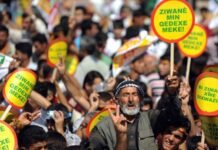The United States Commission on International Religious Freedom (USCIRF) recommended that the State Department place Turkey on its special watch list based on the Turkish government’s perpetration or toleration of serious violations of religious freedom, in its annual report released on Wednesday.
According to the report, religious freedom conditions in Turkey continued to follow a troubling trajectory in 2023. The government “made little to no effort to address many longstanding religious freedom issues and it ignored the continued targeting and vandalization of religious minority properties throughout the country,” USCIRF said.
A total of 10 countries are recommended for placement on the State Department’s Special Watch List based on their governments’ perpetration or toleration of serious violations — Egypt, Indonesia, Iraq, Kazakhstan, Kyrgyzstan, Malaysia, Sri Lanka, Syria, Turkey and Uzbekistan.
According to USCIRF the Turkish government increasingly implemented policies that sought to privilege and promote its interpretation of Sunni Islam and to discourage attitudes or practices that it characterized as “perversions against moral values.” In July the European Parliament expressed concern over “the increasing weight of the Islamist agenda in law-making and in many spheres of the administration, including through an extension of the influence of the Directorate of Religious Affairs (Diyanet) in the education system.”
The report also said throughout 2023, religious communities in Turkey faced significant challenges in opening, regaining and protecting their places of worship and other religious sites. Protestants and Jehovah’s Witnesses frequently struggled to obtain official recognition for their churches and Kingdom Halls, respectively. In one instance local authorities in Konya shut down a Kingdom Hall in July, just a few months after it had opened, following complaints from neighbors.
Alevis, who constitute Turkey’s largest religious minority, continued to experience a lack of official recognition and widespread discrimination.
The report highlighted the continued prohibition on reopening the Theological School of Halki and other religious educational institutions essential to the survival of several religious traditions in Turkey. Additionally, the government did not acknowledge the right to conscientious objection, imposing fines on individuals who refused compulsory military service due to their beliefs.
The year also saw various threats and attacks on places of worship. In early November a man assaulted the pastor of a Protestant church during a service in Eskişehir. Later that month, two individuals broke into the same church, attacking the pastor and other attendees. They demanded to know if those present were Jewish or Israeli and threatened to “set them on fire” if they contacted the police.
Covering the period from January 1 to December 31, 2023, the report documented the persistence of anti-Semitic rhetoric and hate speech in social and print media. It cited an example from October, during the escalation of the Israel-Hamas conflict, where the Islamic Yeni Akit newspaper published a column calling for the revocation of citizenship for Turkish Jews serving in the Israeli military.
The report stated, “Jewish citizens reported that the government’s anti-Israel rhetoric has fueled explicitly anti-Semitic public protests.” It referenced an incident on October 18, involving Suleyman Sezen, a member of the Samsun Atakum Municipal Council, who said, “I remember Hitler with reverence once again. (…) The world will find peace and tranquility after it is cleansed of Jews.”
In its Syria section the report detailed violations committed by armed factions under Turkey’s control or influence. It stated that Turkey posed one of the most significant threats to religious freedom in Syria through its occupation of territory and its military strikes in and near the Autonomous Administration of North and East Syria (AANES) jurisdictions, pursuing what the Turkish government termed Kurdish terrorists.
Factions of the Turkish-backed Syrian National Army (SNA) were reported to have destroyed mosques in Afrin and bulldozed the Yazidi shrine of Chal Khaneh along with other religious monuments and cemeteries. The report criticized the Turkish government’s permissive stance toward the brutality of these Turkish-supported forces against civilian populations and their targeting of religious minorities. This included confiscating property and forcing at least two Yazidis in Afrin to convert to Islam. As a result, Turkish-controlled areas were deemed among the least secure and most damaging to religious freedom in Syria.
USCIRF is an independent, bipartisan federal government entity established by the US Congress to monitor, analyze and report on threats to religious freedom abroad. USCIRF makes foreign policy recommendations to the president, secretary of state and Congress to deter religious persecution and promote freedom of religion and belief.















